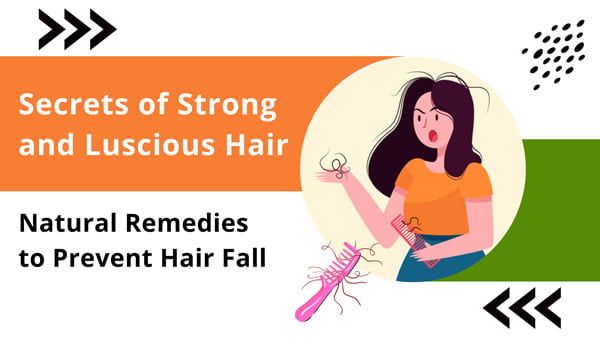Secrets of Strong and Luscious Hair: Natural Remedies to Prevent Hair Fall
Introduction
Hair fall is a common problem that affects people of all ages and genders. It can be caused by a number of factors, including genetics, medical conditions, medication, stress, and poor diet. Hair loss can be either of a short-term or long-term nature, and its intensity can range from mild to severe.
For many individuals, hair loss can be an upsetting experience that causes self-consciousness, reduced self-esteem, and even social withdrawal. In some cases, hair loosing can be a sign of a more serious medical condition.
There are several ways to stop hair falling, such as eating a healthy diet, managing stress, and avoiding hairstyles that pull on your hair. But if you’re losing hair, it’s really important to consult a doctor or dermatologist to identify the root cause and discuss possible treatments.
Why does Hair Fall Happen in Women?
There are several reasons why women may experience hair loss. Some of the most common causes include:
- Hormonal Imbalances: Hormones are important for healthy hair. Changes in hormone levels, which can happen during pregnancy, menopause, stopping birth control pills, or conditions like polycystic ovary syndrome (PCOS), can cause hair loss. These changes affect how hair grows and may result in shedding.
- Stress and Lifestyle: Stress can also cause hair loss. The body produces the hormone cortisol when experiencing stress, which harms hair follicles and can result in hair loss.
- Nutritional Deficiencies: Not having enough important nutrients in your diet, like iron, biotin, and certain vitamins, can weaken your hair, which means it is more likely to fall out. When you do not get enough nutrients, it can play a major role in hair loss, so it is vital to address these deficiencies if you want healthier hair.
- Aging: Natural aging affects health in various ways, including the condition of hair. As we get older, our hair naturally becomes thinner and loses its youthful glow. Hair follicles may also shrink, resulting in reduced hair growth.
- Medical Conditions: Some medical conditions, such as thyroid problems, lupus, and alopecia areata, can also cause hair loss.
- Medications: Certain medications, such as chemotherapy drugs and blood thinners, can also cause hair loss.
- Styling Habits: Overstyling your hair with heat or chemicals can damage hair follicles and lead to hair loss.
The Most Common Types of Hair Fall
Androgenic Alopecia: This kind of hair loss is prevalent and is known as male or female pattern baldness. Genetics and hormones combine to cause androgenic alopecia. It usually begins in individuals aged 25 to 30 and worsens over time.
Telogen Effluvium: This type of hair loss occurs when there is a disruption in the hair growth cycle. It may result from stress, illness, surgery, giving birth, or specific drugs. Telogen effluvium ordinarily clears up by itself in a couple of months.
Alopecia Areata: This is a condition where hair falls out in small circular patches due to an autoimmune disease. Alopecia areata may affect the scalp, beard, and other body areas. The specific cause of the condition is not known, though it is believed to be linked to genetics and the immune system.
Cicatricial Alopecia: Hair loss of this type happens because the hair follicles are damaged. It may result from burns, infections, and particular medical conditions. Cicatricial alopecia is usually permanent.
What are The Natural Sources to Stop Hair Fall Problems?
- Amla (Indian gooseberry): Amla is a rich source of vitamin C, which is essential for healthy hair growth. It also contains antioxidants that can help to protect hair follicles from damage.
- Aloe Vera: Aloe vera contains enzymes that can help to promote hair growth. It also has anti-inflammatory and antibacterial properties, which can help to soothe the scalp and reduce hair loss.
- Coconut Oil: Coconut oil is a natural moisturizer that can help to keep hair follicles healthy. It also contains fatty acids that can help to strengthen hair and reduce breakage.
- Fenugreek Seeds: Fenugreek seeds are a good source of protein and biotin, two nutrients that are essential for hair growth.
- Hibiscus Leaves: Hibiscus leaves contain flavonoids that can help to stimulate blood circulation to the scalp and promote hair growth.
- Onion Juice: Onion juice contains sulfur, which is essential for hair growth. It also has antibacterial properties, which can help to prevent scalp infections.
How to use these natural sources to stop hair fall problems, you can apply them directly to your scalp or use them in hair masks. Here are some recipes:
- Amla Hair Mask: Mix one tablespoon of amla powder with two tablespoons of yogurt. Apply the mask to your scalp and hair, and leave it on for 30 minutes before rinsing it out.
- Aloe Vera Hair Mask: Mix two tablespoons of aloe vera gel with one tablespoon of honey. Apply the mask to your scalp and hair, and leave it on for 30 minutes before rinsing it out.
- Coconut Oil Hair Mask: Massage a small amount of coconut oil into your scalp and hair. Leave the oil on for at least 30 minutes, or overnight. Rinse it out in the morning.
- Fenugreek Hair Mask: Soak a handful of fenugreek seeds in water overnight. Grind the seeds into a paste and apply it to your scalp and hair. Leave the mask on for 30 minutes before rinsing it out.
- Hibiscus Hair Mask: Grind a handful of hibiscus leaves into a paste and apply it to your scalp and hair. Leave the mask on for 30 minutes before rinsing it out.
- Onion Juice Hair Mask: Extract the juice from one onion and apply it to your scalp. Leave the juice on for 30 minutes before rinsing it out.
Some additional tips that may help to solve hair fall problems:
- Eat a healthy diet. Make sure you’re getting enough protein, iron, and other essential nutrients. A healthy diet will help keep your hair follicles healthy and prevent hair loss.
- Reduce stress. Stress can be a major trigger for hair loss. Find healthy ways to manage stress, such as exercise, yoga, or meditation.
- Avoid over-styling. Overstyling your hair with heat or chemicals can damage hair follicles and lead to hair loss. If you must style your hair with heat, use a heat protectant spray first.
- Use the right hair products. Choose hair products that are gentle on your hair and scalp. Avoid products that contain harsh chemicals or sulfates.
- Be gentle with your hair. When brushing or styling your hair, be gentle to avoid damaging the hair follicles.
- Massage your scalp regularly. This can help to stimulate blood circulation and promote hair growth.
- Use a wide-tooth comb to brush your hair. This will help to prevent hair breakage.
- Avoid tight hairstyles, such as braids and cornrows. These hairstyles can put stress on your hair follicles and lead to hair loss.
- Protect your hair from the sun and other environmental damage. Wear a hat or scarf when you’re outdoors, and use a leave-in conditioner with UV protection.
Natural remedies can be effective in reducing hair fall and promoting hair growth. However, it is important to note that these remedies may not be effective for everyone, and it may take time to see results.
Does hair fall reversibly?
Hair loss can be reversible in certain instances, dependent on the type and causation of the loss. Some reversible types of hair loss include:
- Telogen Effluvium: This type of baldness occurs when there is a physical or mental shock to the body, such as stress, sickness, or childbirth. Typically, telogen effluvium will improve naturally within 6-12 months.
- Alopecia Areata: This is an illness that happens when your immune system attacks your hair, causing it to drop out in patches. Alopecia areata can often be undone, and most people grow back their hair within a year.
- Male Pattern Baldness and Female Pattern Baldness: These are the most common types of hair loss, and they are caused by genetics. While male pattern baldness and female pattern baldness are not typically reversible, there are treatments that can help slow down hair loss and promote hair regrowth.
Is Hair Fall a Sign of Any Incoming Disease?
Hair loss can be a sign of an impending illness. Certain illnesses, such as can lead to hair loss:
- Thyroid problems: Hypothyroidism and hyperthyroidism, which are underactive and overactive thyroid conditions, respectively, can both cause hair loss.
- Lupus: Lupus is an autoimmune disease that can affect many parts of the body, including the skin and hair.
- Alopecia areata: Alopecia areata is an autoimmune disease that causes hair to fall out in patches.
- Scalp infections: Scalp infections, such as ringworm, can also cause hair loss.
- Cancer: Some types of cancer and cancer treatments can cause hair loss.
It is important to note that hair loss is a common problem, and it is not always a sign of a serious medical condition. However, if you are experiencing excessive hair loss, or if you are also experiencing other symptoms, such as fatigue, weight loss, or skin changes, it is essential to consult a doctor.
Secrets of Strong and Luscious Hair: Natural Remedies to Prevent Hair Fall Read More »




